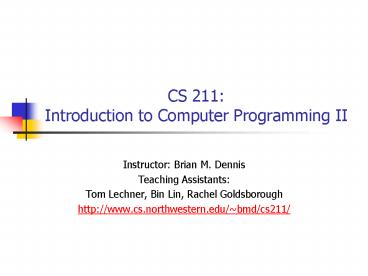CS 211: Introduction to Computer Programming II - PowerPoint PPT Presentation
1 / 17
Title:
CS 211: Introduction to Computer Programming II
Description:
Integer is a sequence of 32 bits. dth bit indicates whether d is ... Use cautiously. Obscures behavior. Can actually implement opposite behavior for an operator ... – PowerPoint PPT presentation
Number of Views:45
Avg rating:3.0/5.0
Title: CS 211: Introduction to Computer Programming II
1
CS 211Introduction to Computer Programming II
- Instructor Brian M. Dennis
- Teaching Assistants
- Tom Lechner, Bin Lin, Rachel Goldsborough
- http//www.cs.northwestern.edu/bmd/cs211/
2
Todays Topics
- Bitwise operators
- Intro operator overloading
- Quiz 1
- Administrivia
- Use office hours
- Face to face clears things up a lot faster
- Reading
- 8.1 8.7
3
BitvectorRepresentation of Sets
- Integer is a sequence of 32 bits
- dth bit indicates whether d is in the set or not
- Operations
- Add to the set
- Delete from the set
- Check for membership
- Union
- Difference
- Intersection
4
Binary Reping Sets
- int set 0x5A // Binary 0101 1010, decimal 90
- // Integers in the set, 1 3 4 6
- // Technically, can hold 32 integers
- // 0 to 31
- // 0000 0000 0000 0000 0000 0000 0101 1010
- // Another set
- int another_set 0xdecafbad
- // 1101 1110 1100 1010 1111 1011 1010 1101
5
Adding an Element
- int set 0x5A // Binary 0101 1010, decimal 90
- // Adding a an integer d to the set
- // Left shift, bitwise or
- int d 7
- int mask 1 ltlt d
- set set mask
- set mask
- set 1 ltlt d
6
Membership Testing
- int set 0x5A // Binary 0101 1010, decimal 90
- // Testing membership of int d in the set
- // Left shift, bitwise and
- int d 7
- int mask 1 ltlt d
- int test set mask
7
Deleting a Member
- int set 0x5A // Binary 0101 1010, decimal 90
- // Deleting d from the set
- // Left shift, negate, bitwise and
- int d 6
- int mask 1 ltlt d // mask 0100 0000
- mask mask // mask 1011 1111
- int test set mask
8
Set Abstract Datatype
- ifndef _SET_H_
- define _SET_H_ 1
- class BitSet
- public
- BitSet()
- void add(int d)
- void del(int d)
- bool is_member(int d)
- public
- int bits
- endif
9
Set Abstract Datatype
- BitSetBitSet()
- bits 0
- BitSetadd(int d)
- int mask 1 ltlt d
- bits mask
10
Set Abstract Datatype
- BitSetdel()
- int mask 1 ltlt d
- mask mask
- bits mask
- bool BitSetis_member(int d)
- int mask 1 ltlt d
- int test bits mask
- test ? true false
11
Set Abstract Datatype
- include ltctimegt
- include ltcstdlibgt
- include "BitSet.h"
- int main()
- BitSet bit_set
- for(int i 0 i lt 10 i)
- int d rand() 32
- bit_set.add(d)
- return 0
12
Operator Overloading
- Syntactic extension
- Class mechanism
- Let's us add new datatypes
- But dont look like builtins
- Method syntax isn't always natural
13
Set Abstract Datatype
- include ltctimegt
- include ltcstdlibgt
- include "BitSet.h"
- using namespace std
- int main()
- BitSet bit_set
- srand(time(0))
- for(int i 0 i lt 10 i)
- int d rand() 32
- bit_set d // Wouldn't it be nice if
14
Set Abstract Datatype
- // Stuff elided
- include ltiostreamgt
- using namespace std
- int main()
- BitSet bit_set
- // Stuff elided
- // Let's print out a bitset
- cout ltlt "BitSet"
- for (int j 0 j lt 32 j)
- if (bit_set.is_member(j))
- cout ltlt j
- cout ltlt ""
- cout ltlt endl
15
Set Abstract Datatype
- // Stuff elided
- include ltiostreamgt
- using namespace std
- int main()
- BitSet bit_set
- // Stuff elided
- // Let's print out a bitset
- cout ltlt bit_set ltlt endl // Wouldn't it be nice
16
Operator Overloading
- // Stuff elided
- BitSet operator(BitSet bs, int d)
- bs.add(d)
- return bs
- int main()
- BitSet bit_set
- for(int i 0 i lt 10 i)
- int d rand() 32
- bit_set d // Wouldn't it be nice if
17
Operator Overloading
- ifndef _SET_H_
- define _SET_H_ 1
- class BitSet
- public
- BitSet()
- void add(int d)
- void delete(int d)
- bool is_member(int d)
- // Let's hook into C's syntax
- BitSet operator(int d)
- private
- int bits
- endif
18
Operator Overloading
- BitSetBitSet()
- bits 0
- BitSetadd(int d)
- int mask 1 ltlt d
- bits mask
- BitSet BitSetoperator(int d)
- add(d)
- return this
19
Operator Overloading
- // Has to be a standalone function not member
function - ostream operatorltlt(ostream os, BitSet bs)
- int foo 10
- cin gtgt foo
- return os
- int main()
- BitSet bit_set
- // Stuff elided
- // Let's print out a bitset
- cout ltlt bit_set ltlt end // Wouldn't it be nice
20
Operator Overloading
- What can be overloaded
- Most operators
- Can't do
- . ., ?
- Can't add any new ones
- Can't change associativity
- Can't change precedence
- Can't change arity
- Nothing done automatically for you
- Issues
- arity binary vs unary
- operator side
- Use cautiously
- Obscures behavior
- Can actually implement opposite behavior for an
operator
21
Thats a Wrap
- Takeaways
- Bits can represent sets
- Building an ADT on that representation
- Operator overloading
- Syntactic extension
- Reading 8.1 8.7































